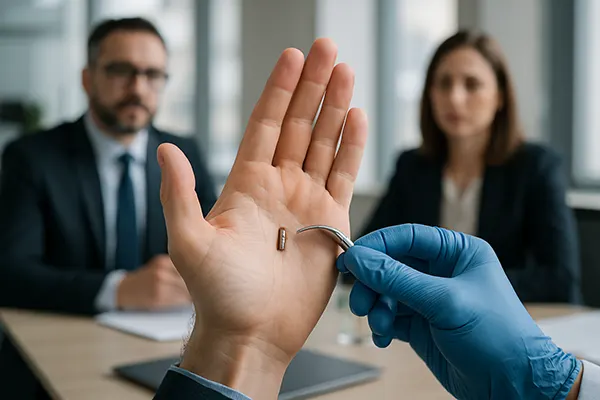As technology evolves at a rapid pace, the concept of embedding biological microchips in employees is gradually transitioning from a speculative idea to a practical reality in the corporate world. These chips, often no larger than a grain of rice, are designed to store data, provide security clearance, enable contactless payments, and even monitor health indicators. While the benefits are compelling for efficiency and innovation, the growing use of biochips in business raises serious concerns about personal freedom, ethical boundaries, and long-term societal implications.
Ethical Implications of Biochip Implementation
The ethical debate surrounding biochip implants centres on the conflict between corporate interests and individual autonomy. While companies may justify the use of microchips for streamlining operations or enhancing workplace security, employees often perceive them as tools of control. Implanting devices into human bodies without fully voluntary, informed consent may border on coercion—especially in work environments where refusal could result in missed promotions or job insecurity.
Furthermore, the notion of body autonomy is at the core of the ethical issue. Requiring or pressuring employees to undergo chip implantation can be interpreted as a violation of human rights. Even if consent is obtained, questions remain about how voluntary that consent truly is, particularly when tied to employment benefits or performance metrics.
Finally, the ethical landscape must also consider the long-term consequences of normalising body-integrated tech. If microchips become standard in corporate settings, will individuals outside of this framework be excluded from opportunities? Could this tech foster a new kind of socio-economic divide? These concerns highlight the need for ethical guidelines and international legal frameworks to regulate biochip usage in the workplace.
Employee Consent and Freedom of Choice
True consent requires transparency, education, and the absolute freedom to decline participation without repercussions. However, in many early pilot projects involving biochip technology, the power dynamic between employer and employee has made such consent questionable. Workers may agree simply to avoid conflict or to keep their job—conditions that challenge the legitimacy of voluntary participation.
In progressive workplaces, some companies have tried to mitigate these concerns by offering alternative methods such as wearable devices. This ensures that those unwilling to have a chip implanted still retain access to workplace services. Such flexibility promotes a more inclusive and ethical approach to technological integration.
Policymakers and labour unions are increasingly demanding transparent protocols and legal protections. Legislative proposals in the UK and EU are currently in review as of February 2025, aiming to restrict forced implementation and establish clear rights concerning digital autonomy in professional environments.
Data Security and Privacy Concerns
One of the most pressing concerns about biochips in corporate use is data security. These implants collect and transmit data that can include biometric identification, access logs, payment history, and even physiological health metrics. If compromised, this sensitive information could be misused for corporate surveillance or fall into the hands of malicious actors.
Modern biochips typically use RFID or NFC technology, both of which have known vulnerabilities. Hackers with proximity access could potentially clone a chip or extract its data, putting both the employee and the company at risk. As a result, cybersecurity experts are urging firms to integrate encryption, anonymisation, and regular firmware updates as standard protocol.
Privacy, too, is an evolving challenge. Once microchip data is linked to workplace behaviour, such as break durations or physical location, it can easily become a tool for surveillance rather than safety. Employees may fear being constantly monitored, which in turn affects workplace morale and trust. Without robust data protection laws and ethical boundaries, the widespread use of biochips risks undermining both privacy and human dignity.
Corporate Accountability and Regulatory Oversight
Accountability is critical when it comes to the use of biochips. Corporations must be held legally responsible for any misuse, data breaches, or unethical practices associated with chip deployment. Unfortunately, as of early 2025, most international regulatory bodies have yet to introduce comprehensive legislation targeting biological chip technologies.
The EU’s General Data Protection Regulation (GDPR) provides some baseline protections, but it was not designed with embedded technologies in mind. There is growing advocacy for updated directives that specifically address bio-integrated systems and mandate corporate transparency and liability in case of violations.
On a global scale, governments are beginning to convene ethical commissions and tech oversight panels. However, without unified standards, there’s a risk that some corporations will exploit regulatory grey areas—particularly in countries with lax privacy laws. It’s essential that international frameworks catch up with technological progress to prevent potential misuse.

Looking Ahead: Integration vs. Resistance
The future of biochips in the corporate landscape is likely to be defined by a balance between innovation and human rights. While the technology promises faster authentication, enhanced security, and improved workplace efficiency, it also opens the door to unprecedented levels of control. As such, the challenge for the next decade will be how to implement these tools responsibly and inclusively.
Public perception remains divided. A 2024 YouGov survey conducted in the UK revealed that only 31% of respondents were comfortable with the idea of voluntary biochip implants, while over 60% expressed privacy concerns. Education campaigns, transparency from developers, and third-party regulation may help increase trust in the technology over time.
In the long run, society may adopt a hybrid approach. Companies could offer both implantable and wearable options, allowing individuals to choose based on comfort and values. The key lies in creating a future where technology enhances freedom rather than restricts it—and where corporate innovation aligns with ethical and legal responsibility.
The Role of Innovation Ethics in Business Strategy
Companies that wish to lead in biochip innovation must incorporate ethical foresight into their strategic planning. This includes assessing the social impact of technological deployment, engaging stakeholders in policy discussions, and investing in ethical training for developers and HR professionals alike.
Business ethics are no longer just a matter of public relations—they are integral to long-term sustainability and legal compliance. Investors and consumers alike are increasingly favouring companies that demonstrate responsibility in their innovation practices, and biochip integration is no exception.
Ultimately, the evolution of biochip usage in the workplace will depend on how effectively ethical, legal, and technical communities collaborate. Businesses that adopt transparent and principled approaches will not only reduce legal risk but also foster trust and loyalty among their workforce.



